1970: A Look Back at a Hectic Summer
Translated from
Jean-Simon Gagné
Le Soleil
https://www.lesoleil.com/actualite/1970-retour-sur-un-ete-survolte-a13dfef70d6b0ef2e27a0f678d9ee8c9
1970 : A Look Back at a Hectic Summer
In a few moments, the Le Soleil’s time machine will plunge you 50 years back in time. In the middle of the hectic summer of 1970, a season when the ” Belle Province ” seemed divided between the spirit of peace and love and the desire to break everything. The summer of 1970 saw the resounding failure of a “made in Quebec” Woodstock festival. It also marked the apogee of the Front de libération du Québec (FLQ), which multiplied attacks. En route to the October Crisis and the introduction of the War Measures Act. Have a good trip.
Welcome to the summer of 1970. The radio plays the Beatles’ Let it Be on a loop and Ray Stevens’ syrupy Everything is Beautiful, which repeats that “everyone is beautiful in their own way”. Flowery fabrics are found everywhere, including on armchairs, carpets and tapestries. This calm is deceptive. Don’t be fooled. Peace and love has some lead in its wings. A “wind of aggression” is blowing over the world. In Paris, on July 21, specialists are even meeting at UNESCO headquarters to study the question!
In Quebec, the Front de libération du Québec (FLQ) has multiplied attacks since the beginning of the year. But violence is not exclusive to Quebec. It is breaking out everywhere. In the United States, between January 1969 and April 1970, more than 4,300 bomb attacks were committed. This figure does not include the 1475 devices defused. In New York City, on average, one bomb attack is reported every two days. (1)
On August 1, in Cabano, Lower St. Lawrence, angry citizens demolish the facilities of the Auteuil Lumber company, a subsidiary of Irving. They did not forgive the company for reneging on its promise to open a mill in exchange for permission to cut wood in the region. The crowd destroys the bridges leading to the forest. Some even want to blow up the large gas tanks at the entrance to the city. (2)
For several days, Cabano ” frees itself “. A citizen sums up his state of mind to Le Soleil: “Better to burn the forest than to have it stolen.” (3)
A concrete love
In Ottawa, the preliminary report of a Senate inquiry reveals that at least 215,000 Canadians had previously used marijuana or hashish. (4) But in Quebec City, it’s not marijuana fumes that plunge Mayor Gilles Lamontagne into a mild euphoria. Rather it is the smell of fresh concrete, which seems to be replacing maple syrup as a national treasure.
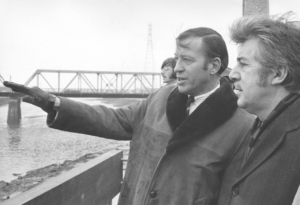
Gilles Lamontagne was mayor of Québec en 1970.
Photothèque Le Soleil
In the Quebec capital, Parliament Hill looks like a bombed-out area. Hundreds of houses have been razed to make way for buildings baptized with letters, as if they were on a lunar base. On Grande Allée, the ” H Complex “, which will soon be nicknamed the “bunker” or “the radiator”, is completed. Further on, ” G Complex ” begins to emerge from the earth…
This is only the beginning. Mayor Lamontagne is clearing the way for the city’s population to double by 1980. He announces the construction of a six-lane highway on the cliff between Québec City and Sainte-Foy. He also mentions a monorail between Cap-Rouge and Beauport. The mayor is thinking big. The future Pierre-Laporte Bridge would not be inaugurated until November. But the mayor is already afraid that it will be very congested before 1980! To solve the problem, he advocates the construction of a bridge-tunnel linking Québec City and Lévis. As soon as possible. (5)
All right. The future looks bright, but the city has more immediate problems. In Vieux Québec, police are concerned that hippies are scaring tourists away. On July 16, they launch a “large-scale” operation to keep young loafers away from the Place d’Armes, in front of the Château Frontenac. Thirteen people are arrested. They are accused of “blocking the crosswalk”, singing “too loud” and “spraying people with water from the fountain”. Isn’t that scary?
Is the spirit of peace and love dead? Maybe not quite. In early July, commercials on the popular radio station CHRC announce the arrival of a dynamic young host who will “graciously” accept everyone’s opinions on the Point of View program. (6)
His name? André Arthur…
The ” Cows” and “Clowns” Show
In Quebec, the election campaign leading up to the April 29th elections was unusually ferocious. It left its mark. Liberal minister Pierre Laporte called the PQ “bombers”. Parti Québécois leader René Lévesque likened the new Liberal government to “a bastard by-product of Pierre Elliot Trudeau’s English-speaking ghetto” [Prime Minister of Canada]. As soon as the National Assembly reopened, insults rained down on the Green Room*. People called each other “cow”, “clown” and even … “fetus”. (7)
On July 7, the head of Social Credit, Camille Samson, makes an appeal for dignity. According to him, the problem is due to the sloppiness of the MPs’ dress code. In particular the miscreants who wear red, blue, or yellow shirts, in short, any color other than white! Admit that it is obvious! Somewhat unsettled, the President of the Assembly promises to look into the thorny question.
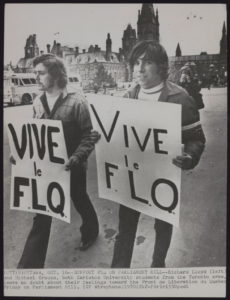
FLQ supporters, a couple months before the October Crisis.
Photothèque Le Soleil
By all accounts, the Parti Québécois was the big loser in the election. With 23 per cent of the vote, the PQ won only seven out of 108 deputies. Defeated in his own riding, Leader René Lévesque came out feeling discouraged.
He is now thinking of leaving politics. On August 31, a headline in the Montreal Star states that he is “seriously” considering running for mayor of Montreal against Mayor Jean Drapeau. In the meantime, Pierre Péladeau has come to his rescue. He offers him a column in his newspapers in Montreal and Quebec City, with a salary of $200 per week… (8)
The FLQ season
During the election campaign, the FLQ observed a “truce”. It did not last. On May 31, five bombs exploded in the Westmount neighborhood. On June 24th, an explosion demolished a wall at Defence Headquarters in the heart of Ottawa, killing one employee. On July 14, a device consisting of 120 sticks of dynamite was defused at the back of the Bank of Montreal’s head office in Old Montreal. According to police, it was “the largest home-made bomb ever planted by terrorists in North America” .
The new Minister of Justice, Jérome Choquette, offers a $50,000 reward to anyone who helps pin the FLQ and its accomplices, which is more than $330,000 in today’s money. In Montreal, an officer in the anti-terrorist section boasts that the police have trained double agents with long hair and beards. “Our hairy guys started infiltrating the FLQ,” he tells the Montreal Star. (9)
At the beginning of June, the police thwarted in extremis a plan to kidnap the U.S. consul in Montreal by the FLQ. Throughout the world, several kidnappings turn out to be “profitable”. In Brazil, the extreme left-wing group Ação Libertadora Nacional had just obtained the release of 40 prisoners in exchange for the German ambassador. The latter was quickly released after the 40 prisoners were flown to Algeria… (10)
Premier Robert Bourassa describes FLQ members as “fanatics” fighting for a “dying” cause. A few weeks later, on the night of July 16, the police defuse an explosive device placed against a wall of the Victoria Hotel on the Côte du Palais in Quebec City. As luck would have it, this is the establishment where the Prime Minister is staying…
Medical guerrilla warfare
The summer is marked by many strikes. In Quebec City, the port was paralyzed throughout July by a longshoremen’s strike. Wages were low. Anger was rife. In the United States, feminists such as Betty Friedan invited American women to go on general strike on August 26. They recommend that they stop everything that day. She means work. Childcare. Cooking. Even sex.
In Quebec, the most bizarre confrontation takes place in the medical world. All summer long, the universal health insurance project is facing fierce opposition from medical specialists. They threatened to go on strike. They demanded $39,000 a year, plus $18,000 in office expenses. The government offered them $29,000 plus expenses. The president of the Federation of Medical Specialists, Raymond Robillard, denounced Medicare as a “socialist” state system. He believed that physicians would become “conscripts” deprived of their liberty. Like soldiers. (13)
In the meantime, some hospitals find themselves in a pitiful state. On June 19, the Montreal Star unveiled a damning report on 13 Montreal institutions that pose a threat to public health. Ventilation was deficient everywhere. Death certificates were falsified to cover up errors. Only 40% of deaths caused by contagious diseases are reported. Laboratories and autopsy rooms are appallingly dirty. In some places, the rooms haven’t been cleaned for two years! (14)
What will the future look like?
We don’t really know where the world is going. All we know is that it’s moving fast. On July 9, the maximum speed on the “Trans-Canada” highway was increased from 60 to 70 miles per hour (96 to 112 km/h). Nothing to improve the catastrophic road toll. On Father’s Day weekend, June 20 and 21, no less than 25 people died on Quebec roads. Seatbelts remain a rarity. Almost an object of curiosity. But all is not lost. The Supreme Court has just approved the legality of an object still shrouded in mystery: the breathalyzer.
Turn left or right? At a welfare conference in Toronto, a doctor proposes to sterilize welfare recipients. At the same time, a brief submitted to the Senate recommended adding vitamins to rubbing alcohol to improve the health of the “indigents” who drink it. In Quebec City, school boards declare war on long hair. The regional school Louis-Fréchette goes even further. It also wanted to restore the uniform and ban all sweets. It even proposed to ban the reading of magazines that were not available in the library. That means Playboy, but also Pray in Church …
In the United States, the New York Times wonders if the decline of American power is momentary. The country is shaken by race riots. Its share of world trade has fallen from 30% to 18% in the space of 20 years. (15) At the same time, specialists brought together by the Massachusetts Institute of Technology are worried about the deterioration of the biosphere. And the Secretary General of the United Nations, U Thant, is sounding the alarm. He asserts that pollution threatens the very existence of humanity. He calls for… immediate action.
In the fashion world, the noon and maxi skirts threaten the mini-skirt. But the “mini” does not admit defeat so easily. In Montreal, two known publicists come to its defense. According to them, the women who show their legs “take part in the community spirit”. Even the Soviet world interferes in it. In East Germany, a designer declared that the [longer] dresses are not well adapted to the “development of the female personality in a socialist environment”…
It’s true, we can see that there are fewer and fewer fish in the oceans, but the fisheries of the future will have the answer to everything, predicts a senior official from the Canadian Department of Fisheries. On July 29, Monsieur advocates the use of dyes and chemical powders to “force fish to congregate. He is also enthusiastic about “taming” dolphins. “… By installing an ultrasound transmitter on their backs, we will track them, he writes. We can then train them to herd the tuna…”. (16) The fish of the future just have to behave.
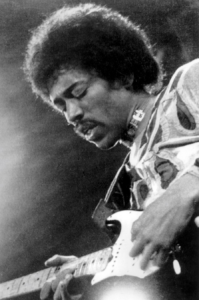
18 Septembre 1970, Jimi Hendrix, whom all dreamed of seeing perform a pop festival in Quebec, dies of an overdose.
Photothèque Le Soleil
The Calm Before the Storm
Beginning in August, the FLQ bombings paused. The calm before the storm. “At the end of the summer, we were told […] to be discreet, because we had to be careful not to interfere with the fall offensive that was being prepared,” says felquist Robert Comeau in his memoirs. (17) Can Quebec’s independence be achieved democratically? asks the Canadian Press to René Lévesque. “I honestly believe there is still a chance,” the PQ leader replies.
In mid-August, Perspectives magazine published an interview with two members of the FLQ who are training in a Palestinian camp in Jordan. “Selim” and “Salem” say they are preparing for “urban guerrilla warfare” and “selective assassinations”. (18) “The youth of Quebec have become radicalized,” laments Jean-Paul Desbiens, editorialist for La Presse. In independence circles, he will soon be renamed “the gossip of service”.
Far from calming the game, the Prime Minister of Canada, Pierre Elliott Trudeau, mocks the independentists. In an interview with the BBC, the British state radio, he explained that everything was the fault of President Charles de Gaulle, who cried “Vive le Québec libre” (Long live a free Quebec) in July 1967. “Before this incident, [Quebec’s independence] was widespread among only a few intellectuals,” he explained. After that incident, “some Quebec women believed that because their husbands were drinking, their sons were out of work, or their pipes were leaking, constitutional changes might be able to solve these problems.” (19)
The summer of 1970 is coming to an end. Paul McCartney has just announced the definitive break-up of the Beatles. On September 18, guitarist Jimi Hendrix, the very one we dreamed of seeing in a pop festival in Quebec, dies of an overdose.
Peace and love will soon be dead and buried.
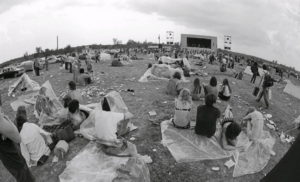
At the end of June, a “Quebec Woodstock” is announced. It takes place from July 31 to August 2 in Manseau, about 100 kilometers from Quebec City.
Photothèque Le Soleil
THE SPLENDOR AND MISERY OF A QUEBEC WOODSTOCK
At the end of June, a “Quebec Woodstock” was announced, in reference to the successful festival that brought together hundreds of thousands of young people in New York State in August 1969. It will take place from July 31 to August 2 in Manseau, about 100 kilometers from Quebec City. Sky is the limit. Organizers are announcing 50,000 people. Maybe more. They circulate rumors that evoke the coming of Jimi Hendrix, the guitar prodigy who performed at the real Woodstock.
Skeptics are suspicious. Is Jimi Hendrix in the Bois-Francs as likely as catching a trout with feathers on St-Laurent Boulevard in Montreal?
Scarcely after being announced, the Quebec Woodstock began to take on water from all sides. Demonstrators threaten to block the entrance in order to lower the prohibitive admission price by $15. The authorities were completely panicked and hesitated to provide permits for a festival where “people will take drugs and dance naked”. The performers are begged to go. The Montreal Musicians’ Guild is at war with the main organizer, which has not respected certain contracts since 1968. (11)
Until the end, the organizers are expecting the presence of Robert Charlebois, Johnny Winter, Creedence Clearwater Revival (CCR) and co. Up until the end, the organizers are circulating the figure of 25,000 tickets sold. On July 31st, the festival opens in total confusion. If we subtract the numerous police officers patrolling around the site, only a few thousand people are present. At 6pm, a few minutes before the opening, there is not even an official program.
The three-day adventure ends in total disaster. Apart from the torrential rain, any resemblance with the “real” Woodstock festival is due to an unfortunate coincidence. Food and gift vendors lose large sums of money. Including ice cream vendor Laplante Speedy Drugstore, who calls himself by his initials “LSD”.
In the end, even those who wanted to play hippies living on love and fresh water are disappointed. The only stream that runs through the festival site is muddy and polluted. The sun is ruthless. ” The failure was that the campsite was too expensive and shabby, the show was boring and badly organized; it was a mystifying adventure… ” (12) Jean-Simon Gagné
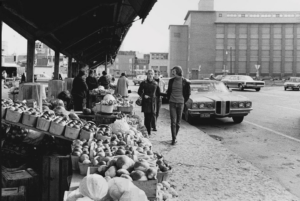
Un marché public dans Saint-Roch en 1970.
Photothèque Le Soleil
WHAT TO DO IN QUEBEC CITY IN THE SUMMER OF 1970?
Are you planning a trip to Quebec City in the summer of 1970? Here are a few suggestions for outings to make the trip more enjoyable…
We might as well warn you. In the summer of 1970, the trend of German breweries and Bavarian music took its toll. It was almost as widespread as the use of stucco in architecture. But we won’t judge. Fans are spoilt for choice, with regular shows at the tavern-restaurant Le Bavard Roy, the Lili Marlene restaurant, the Jean Talon restaurant-brewery and the Victoria cabaret. The most determined will go as far as the Vieux Moulin de Saint-Laurent, on Île d’Orléans, to hear the 100% Bavarian music of an orchestra called Les Gais meuniers (The Gay Millers).
No need to add anything else. You have been warned.
In 1970, the Summer Festival lasts three weeks, from July 18 to August 8. The organizers are proud to say that the program was put together at the last minute, when the Ministry of Cultural Affairs finally confirmed its subsidy! For its third edition, the event offers five plays and a week of cinema for children. On July 25, don’t miss the concert by pianist Oscar Peterson. The same goes for the closing night, which will feature Jean-Pierre Ferland.
On June 10, Johnny Farago and Patrick Zabé sing at Le vieux Bardeau club in Beauport. Afterwards, outdoor shows took over. On June 28th, Claude Gauthier will be at the Orléans beach in Saint-Jean on Île d’Orléans. On July 23rd, Louise Forestier and Raoul Duguay’s Infonie give a show on the soccer field of the Cégep de Limoilou. The entrance fee was set at one dollar.
Before leaving, the nostalgic ones may want to take a little trip to the cinemas. The Cartier proposes Let it Be, by the Beatles. L’Empire announces L’aveu de Costa-Gavras. La Canardière cinema presents Hibernatus, with Louis de Funès. For the more home-loving, there is still television, with Grujot and Délicat, Au pays des géants, Cher Oncle Bill, Mission impossible and the exploits of Doctor Marcus Welby.
On September 8, Télé-Métropole presents the premiere of the soap opera Symphorien, with Gilles Latulippe, Juliette Huot and Janine Sutto. Not forgetting Fernand Gignac in the role of Éphrem, the idiot on duty. But maybe you would have preferred not to know that…
++
1970 IN NUMBERS
15 Number of deaths on Quebec roads during Father’s Day weekend, June 20 and 21.
$850,000 “Theoretical” value of counterfeit American bank bills discovered in a locker at the Palais train station on July 14. More than $5.6 million in the U.S. currency of today.
$0.18 Price of coffee (with two creams) at the offices of the federal government when officials launched a protest movement to demand an immediate decrease.
$17,900 Average price of a three-bedroom bungalow in Charlesbourg ($280,000 in 2020)
1 Number of teachers fired during the 1969-1970 school year for refusing to cut their beard. The teacher was rehired in June by court order.
$15 Admission to the three-day Manseau Pop Festival [approximately $100 in today’s money].
$2999 Price of a new mid-size car at the time (1970 Pontiac Strato Chief). In 2020, a Toyota Corolla costs $21,159.
$6.95 Price of a return trip from Quebec City to Montreal by bus ($58.70 in 2020)
$20,164 Average salary of a dentist ($142,000 in 2020)
$1.65/hour Minimum wage, starting in July 1970 ($12.50 in 2020)
$519 Price of a 25-inch (63.5 cm) color television
$0.69 Price of a pound of butter (approximately $5 in 2020)
NOTES
(1) Louis Fournier, FLQ, Histoire d’un mouvement clandestin, Québec/Amérique, 1982.
(2) «Août 1970 : les cinq jours qui ont changé Cabano», Le Soleil, 31 juillet 2010.
(3) Le Soleil, 3 août 1970.
(4) Commission d’enquête sur l’usage des drogues à des fins non médicales, Rapport final, Ottawa, Information Canada, 1973, 1160 pages.
(5) Le Soleil, 4 juillet 1970.
(6) Le Soleil, 6 juillet 1970
(7) Le Soleil, 16 juillet 1970.
(8) Pierre Godin, René Lévesque, Héros malgré lui, (vol. 2, 1960-1976), Boréal, 1997.
(9) Montreal Star, 19 juin 1970.
(10) «Kidnappers Free Bonn Envoy in Rio», The New York Times, 17 juin 1970.
(11) «History Through Our Eyes: Aug. 3, 1970, Manseau Pop Festival», Montreal Gazette, 3 août 2019.
(12) Le Soleil, 8 août 1970.
(13) Le Soleil, 12 août 1970.
(14) Le Soleil, 20 juin 1970.
(15) Rick Perlstein, Nixonland, Simon & Schuster, 2008.
(16) Le Soleil, 29 juillet 1970.
(17) Robert Comeau, Mon Octobre 70, la crise et ses suites, VLB éditeur, 2020
(18) Perspectives, 15 août 1970.
(19) Le Soleil, 13 juillet 1970.
